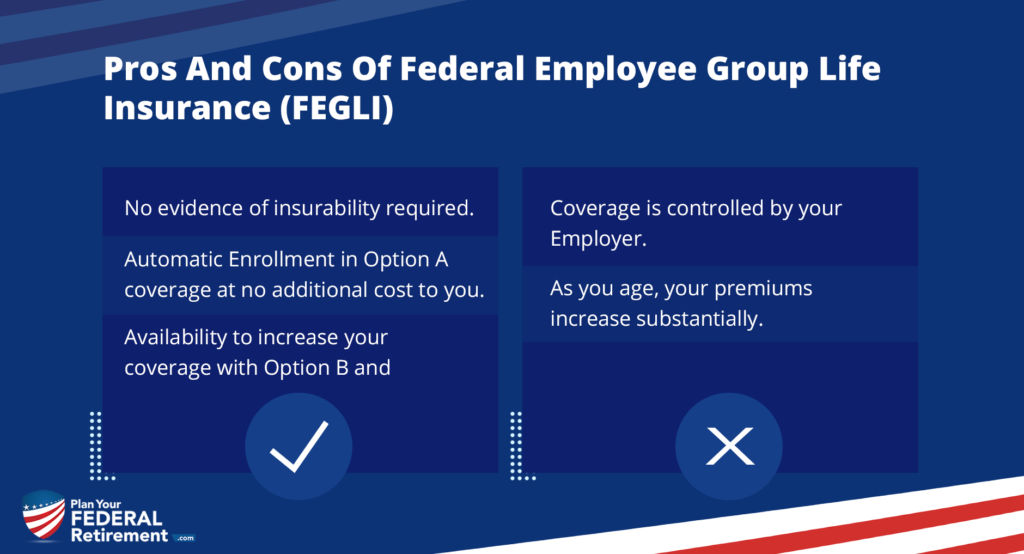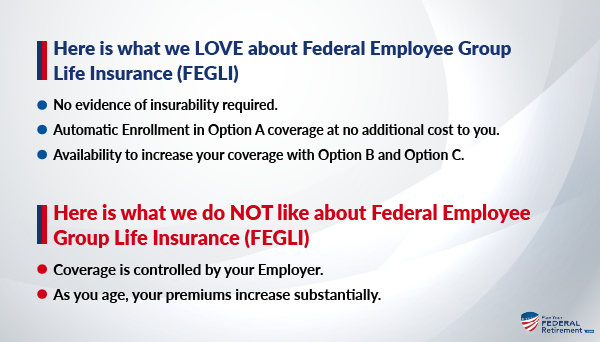I researched the cost of life insurance and purchased a 20 year fixed plan that costs less than half what FEGLI will for me starting next year. I am 54 and FEGLI premiums jump (60% more?!) at age 55 and even more at age 60 (more than double!). Before I cancel the Option B FEGLI multiples (currently 5x) I have, is there anything I should consider? I am keeping the Basic and Option A that I will carry into retirement at the 75% reduction so it will be free at 65.
Do not cancel Federal Employee Group Life Insurance (FEGLI) Option B before you read this article.
As a Federal Employee in the FERS program, you are able to enroll in the Federal Employee Group Life Insurance program. This is a phenomenal benefit for Federal Employees who are looking for additional life insurance coverage through their employer.
Here is what we love about Federal Employee Group Life Insurance (FEGLI)
- No evidence of insurability required.
- Automatic Enrollment in Option A coverage at no additional cost to you.
- Availability to increase your coverage with Option B and Option C.
Here is what we do NOT like about Federal Employee Group Life Insurance (FEGLI)
- Coverage is controlled by your Employer.
- As you age, your premiums increase substantially.
Federal Employee Group Life Insurance (FEGLI) is not “good” or “bad” life insurance. Rather, like all of your benefits, it is a tool that you as the Federal Employee must learn how to effectively use in your financial planning.
In this article, we are going to dive into the pros and cons of Federal Employee Group Life Insurance (FEGLI) so that as a Fed you can better understand your benefits and choices.
What is Federal Employee Group Life Insurance
Federal Employee Group Life Insurance is a term insurance product. It is offered to a large group of people: those actively employed with the Federal Government.
Term life insurance works similarly to car insurance in the sense that you pay for the coverage each month, your premium, and hope that you do not have to use it!
Because Federal Employee Group Life Insurance is term insurance, there is no cash value that is accumulated. This is an important distinction because other life insurance products, such as Universal Life or Variable Universal Life, do offer cash accumulation.
The term for Federal Employee Group Life Insurance ends upon the Federal Employee’s termination from federal service or death. In retirement, you are able to maintain coverage which we will address.
Currently, the Office of Personnel Management has a contract with the Metropolitan Life Insurance Company (MetLife) to provide this term life insurance for federal employees.
Once you enroll in Federal Employee Group Life Insurance, you have some choices as to what additional coverage options you would like to participate in, at a cost.

Basic Coverage | FEGLI
Once you are eligible to enroll in benefits, at the start of your career, you are automatically enrolled in Basic insurance unless you waive this coverage.
The “Basic” insurance covers your life for whichever is greater:
1) Your annual salary, rounded up to the next even $1,000, plus $2,000; or
2) $10,000. This is called the Basic Insurance Amount.
What is the cost for Basic FEGLI?
The Government pays one-third of the premium cost for Basic and you pay two-thirds, unless you are a USPS worker. If you work for the United States Postal Service, the agency pays 100% of federal employees basic coverage.
If you are younger than age 45, you automatically have extra coverage without paying any additional premium. This Extra Benefit increases the amount of Basic insurance payable at the time of your death if you die before you reach age 45.
Your premium is automatically deducted from your paycheck and you can see this reflected on your Leave and Earnings Statement (LES). You pay for FEGLI Basic up until age 65.
At age 65, you are eligible to make a 75% reduction in your coverage. For example, if your benefit was $100,000 then you could elect a 75% reduction in which the benefit will be reduced by 2% each month until you reach $25,000 in coverage. At this point, your Basic Life Insurance is 100% paid up. Remember, you just spent your entire career paying into this policy so before you decide to just cancel it, does it make sense to elect a 75% reduction instead? This needs to be a question that you’re asking your Financial Advisor and of course, make sure that they understand your benefits in detail. Your retirement is too important to work with someone who does not really know your Federal Employee benefits.
Now, let’s dive into the additional coverage options that you have with Federal Employee Group Life Insurance. These coverages, listed below, are optional and at the discretion of the individual.
Option A - “Standard” Federal Employee Group Life Insurance
Optional A is often referred to as a “Standard” insurance coverage because it is a flat amount and there are no multiples that can be applied.
Option A provides Feds with an additional $10,000 of term life insurance.
This may not sound like a lot but if you, like many Federal Employees, run the risk of being non-insurable in the private sector then having additional coverage like this may be really valuable.
Remember, with Federal Employee Group Life Insurance there is no medical underwriting required because the entire group, Federal Employees, are being covered. Oftentimes people with nicotine habits, adverse medical conditions, or even mental health issues that have made it difficult to obtain coverage outside of conditions in which there isn’t a requirement for medical underwriting, should consider Option A in their financial planning.
Option B - “Additional” Federal Employee Group Life Insurance
Option B provides Feds with an opportunity to enroll in additional, term insurance at various multiples of their annual pay.
As a Federal Employee, you can choose:
1x – Your Annual Salary
2x – Your Annual Salary
3x – Your Annual Salary
4x – Your Annual Salary
5x – Your Annual Salary
No matter which multiple you choose, 1-5, your salary will be rounded up to the next even $1,000. This makes the math really simple, let’s walk through an example:
Your Annual Salary | Multiple | Insurance Coverage Amount |
$99,500.00 | 1x – Your Annual Salary | $100,000 |
$99,500.00 | 2x – Your Annual Salary | $200,000 |
$99,500.00 | 3x – Your Annual Salary | $300,000 |
$99,500.00 | 4x – Your Annual Salary | $400,000 |
$99,500.00 | 5x – Your Annual Salary | $500,000 |
Your premiums begin to increase for Option B FEGLI around age 35 but you really do not “FEEL” it until you reach age 55 and your premium almost doubles.
At age 60, guess what? That premium is going to substantially increase again.
Remember, how do insurance companies tell us that they would really rather not have to keep our coverage in place? They raise premiums!
Christopher, our Federal Employee who submitted this great question for our FERS Federal Fact Check submitted this great question about when is the right time to look at either canceling or replacing FEGLI Option B.
Christopher, if you have not tuned into our podcast Episode 24 in which we go through FEGLI – EXTENSIVELY – with Tammy Flannagan. It is worth a listen because we are going to go through all the pros, cons, and what you need to do BEFORE and AFTER you consider enrolling or enrolling in FEGLI.
Since Christopher is age 54, he is looking at potentially replacing his FEGLI in the private sector. This is a great idea for Christopher as oftentimes, as long as you’re insurable, you can find private insurance at far less than the cost of Option B once you are over age 55.
However, there are hard rules when we work with clients that want to explore this,
DO NOT CANCEL OPTION B until you are 100% sure that you have replacement coverage in force.
Ok, just one rule. But it is a big one. We cannot tell you how often we have watched people cancel their additional coverage because the premium was intolerable only to discover that they were uninsurable in the private sector. Or, because of adverse lifestyle choices, find that the premiums in the private sector are MORE than those of FEGLI.
Keep your current coverage in place until your replacement coverage is in force.
Option C - “Family” FEGLI
Option C provides life insurance for your legally married spouse and any and all eligible dependent children. If you are still claiming an adult child on your tax return, they are eligible for this family coverage.
This life insurance also comes in multiples that you can elect. Each multiple is $5,000 for a spouse and $2,500 for each eligible dependent.
For example, spousal coverage would look like:
Relationship | Multiple | Insurance Coverage Amount |
Spouse | 1x | $5,000 |
Spouse | 2x | $10,000 |
Spouse | 3x | $15,000 |
Spouse | 4x | $20,000 |
Spouse | 5x | $25,000 |
For example, dependent coverage for 1 child would look like:
Relationship | Multiple | Insurance Coverage Amount |
Dependent Child | 1x | $2,500 |
Dependent Child | 2x | $5,000 |
Dependent Child | 3x | $7,500 |
Dependent Child | 4x | $10,000 |
Dependent Child | 5x | $12,500 |
Like all other aspects of FEGLI, there is no evidence of insurability required for your spouse and/or dependent children. While the coverage may seem small, they are at least coverage and can be helpful when insurance is not otherwise available.
Accidental Death & Disability (AD&D)
Accidental death and dismemberment (AD&D) coverage is an automatic part of Basic FEGLI insurance and Option A FEGLI for federal employees. You will need to make an election for this coverage but there is no additional cost to you.
Accidental Death & Disability (AD&D) is not available for Option B FEGLI or Option C FEGLI.
Accidental death benefits are payable when you sustain injuries by accidental means. This is proven when the death certificate of the decedent is marked, “accidental”. This can be at the time of the trauma or if the person passes within one year after the date of the trauma.
Because of the nature of Accidental death benefits, which are only payable IF a person passes away from the cause of an accident, you should consider enrolling in this coverage because there is no additional cost. However, you should not incorporate these benefits into your financial plan as part of the assessment you make for income replacement in the event of your untimely death.




